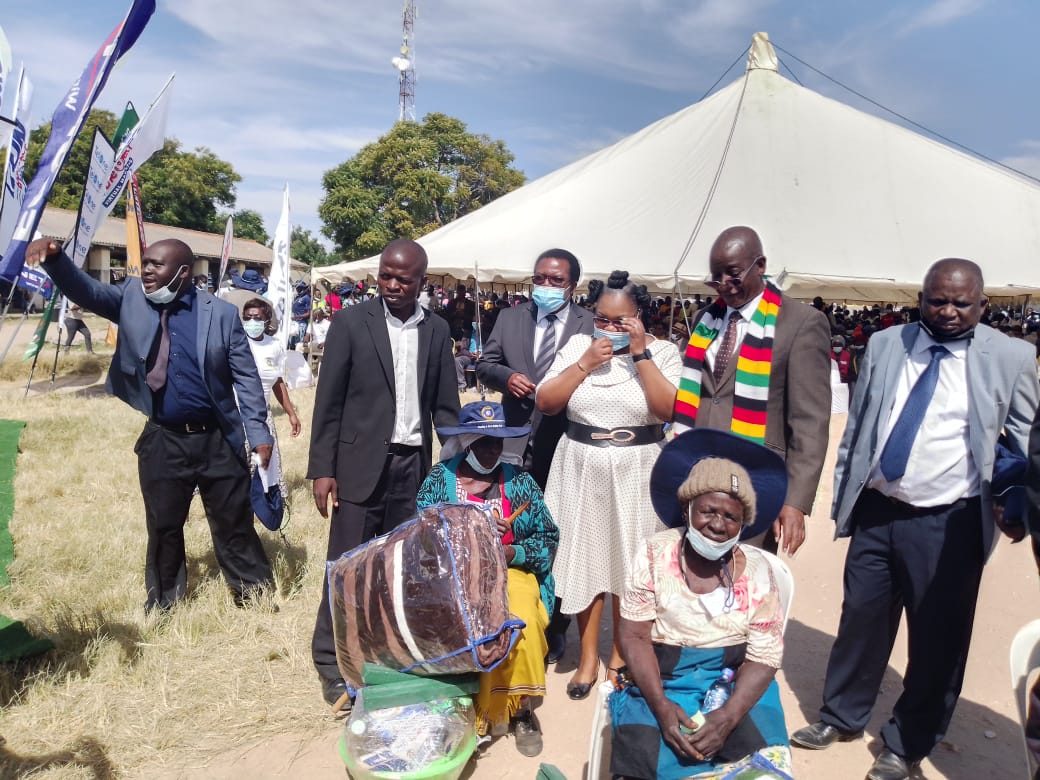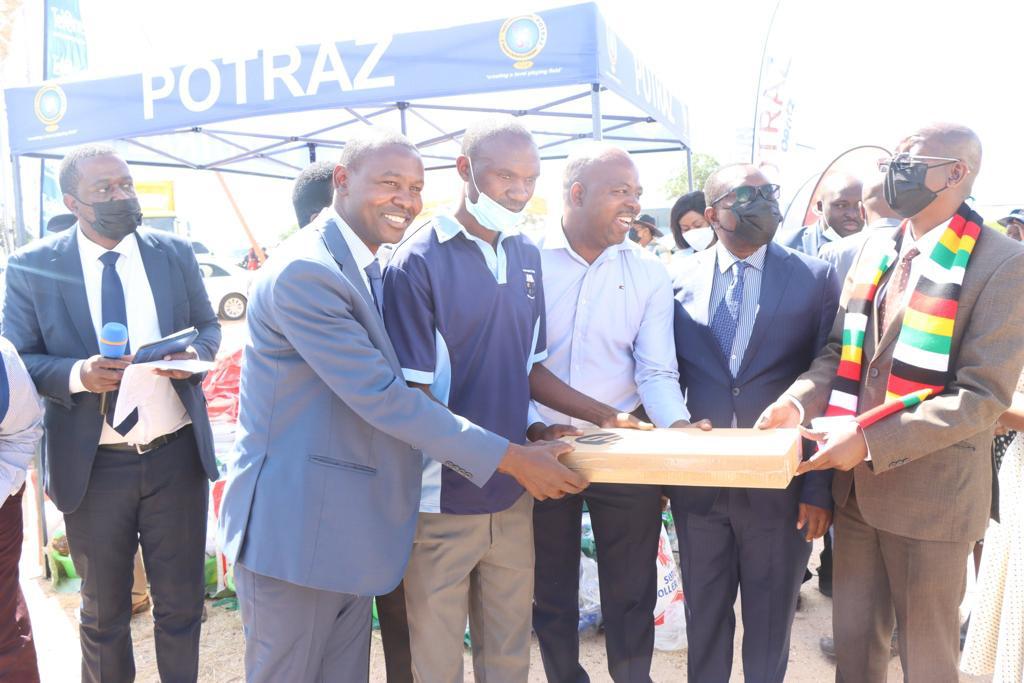|
Getting your Trinity Audio player ready...
|
Zimbabwe is living to the letter and spirit of leaving no one and no place behind as it takes on board the needs of elderly people in the entrenchment of digital technologies, a senior government official has said.
This was revealed by Dr. Jenfan Muswere, the Minister of Information Communication Technology (ICT), Postal and Courier Services on the commemoration of World Telecommunications and Information Society Day held today at Murombedzi Growth Point in Mashonaland West Province.
The World Telecommunications and Information Society Day is a day set aside annually to help raise awareness of the possiblities that the use of internet and other Information and Communication Technologies (ICT) can bring to societies and economies,as well as of ways to bridge the digital divide.
World Telecommunications and Information Society Day has been celebrated since 1969,marking the founding of ITU and the signing of the first International Telegraph Convention in 1865.
“This year’s theme for World Telecommunications and Information Society Day is ‘’Digital Technologies for Older Persons and Healthy Ageing”. This year’s theme is in alignment with the Government’s agenda of leaving no one and no place behind, hence even the older people are not left behind.
“Ladies and gentlemen, this year’s theme raises awareness of the important role of the ICTs in supporting people to stay healthy, connected and independent – physically, emotionally and financially,” Dr. Muswere said.
The Ministry has embarked on an initiative to introduce ICTs to all areas in Zimbabwe which are marginalised, remote and have no mobile network coverage let alone internet access, such areas like Hurungwe, Nyakomba, Mlambapele, Thuli, Mola, Mudzi to name but a few.
It also endevours towards making sure there is availability of ICT infrastructure throughout the country to help provide internet conncectivity by rolling out various programs and projects like the ICT Lab per school project, which speaks to connect a school connect a community drive, and the various Community Information Centres(CICs) in many rural districts, growth points and service centers across Zimbabwe.
Today, Nyamhunga Secondary Chitimbe Primary, Dzikamidzi Secondary, Tafira High, Trelawney Secondary, Huyo Primary, Hombwe High, and Katawa High schools all received 25 computers each.
The Minister said the determination of World Telecommunications and Information Society Day (WTISD) is to raise awareness of the possibilities that the use of the Internet and other information and communication technologies (ICTs) can bring to societies and economies, as well as of ways to bridge the digital divide obtaining in the urban and rural areas. Thus access to the internet is a critical cog in enabling a digitally empowered economy by the year 2030.
Dr. Gift K. Machengete, the Director-General of the Postal and Telecommunication Regulatory Authority (POTRAZ) said this year’s theme was apt in that it seeks to correct an imbalance whereby older persons were being left out in the digital revolution as most focus and attention is being placed on the young.

“Only last week we were commemorating Girls in ICT Day where the focus was on ICT access and use by girls and young women. In addition, POTRAZ has been holding Hackathon competitions targeting young innovators. The Authority is also planning on rolling out ICT Clubs in schools to advance ICT skills among the youth and promote peer education on issues to do with online safety. Speaking of online safety, the focus has been on Child Online Protection and hardly ever on protection of the elderly online.
“When we speak of inclusive ICT access and use, focus has been on inclusion of People with Disabilities, people in remote rural areas as well as girls and women. Seldom has focus been on the elderly who are in fact also an excluded constituency in terms of ICT access and use,” Dr. Machengete said.
He said unlike young people born in the digital era who have even been christened Digital Natives, older persons are not good with ICTs, they are not familiar with ICTs and hence they are quite vulnerable to things like Internet fraud.
“Furthermore, because older persons, whom some call Digital Migrants, are not well conversant with ICTs as the younger generation, they tend to be left out in terms of participating in the digital economy hence undermining their economic potential and their potential to meaningfully contribute to national development.
“Older persons are having to compete with youngsters in this fast-paced digital world and they are being beaten left right and centre due to their limited ICT aptitude. Because of such limited aptitude to ICTs, older persons have not been able to fully leverage on ICTs to their business ventures, be it in agriculture, manufacturing, trade you name it. This is because they are not familiar with the numerous technologies and applications for e-agriculture and e-commerce – they are not familiar with artificial intelligence and robotics and no one has really cared as care and attention has mostly been placed on the youth.”
Dr. Machengete called on stakeholders to change that scenario by including the elderly in digital literacy programs and ICT skills development initiatives so that they fully participate in the digital economy.
“It is not too late to train older persons on IT security so that they are not targets for Internet scams. It is not too late to teach older persons digital tools and applications they can use in farming and in any business ventures they may be involved in. This reminds me of an inspirational quote from an anonymous author who says “No matter how long you have travelled in the wrong direction, turn around,” he added.
The ICT champion said ensuring the participation of the elderly in ICTs would certainly facilitate their Healthy Ageing. This is because of the ease of doing things and the convenience brought about by ICTs.
He alluded to the possibilities brought about by e-health whereby older persons are able to consult health care practitioners online and do not need to travel to a healthcare facility and have drugs delivered to their doorsteps.
“Imagine the possibilities of online shopping, should older persons need groceries or clothing items. Imagine a farmer simply having to order implements online or requesting a tractor to till their land online. Imagine the elderly participating in zoom meetings and webinars where they can learn about their health – issues like prostate cancer which mostly affects men who are advanced in age, and issues of mental health that also affect the elderly among other issues.
“Certainly the possibilities brought about by ICTs are many. Such possibilities would give older persons some peace of mind and some comfort, hence, promoting Healthy Ageing.”
POTRAZ has been cognisant of the need to train the elderly in ICTs and involve them in ICT programs. The Authority in this regard has been training digital literacy skills in older persons at the various Community Information Centres (CICs) countrywide.
“However, we appreciate that not much effort was being made on this front, and going forward, POTRAZ shall be providing connectivity and donating computers and other ICT equipment to Old People’s Homes and to the elderly in the communities. These donations would be followed up with training in ICTs to ensure older persons fully benefit from digital technologies and age well with the help of ICTs.”






